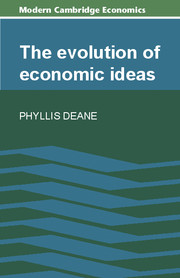Book contents
- Frontmatter
- Series preface
- Contents
- Introduction
- 1 Origins of modern economics
- 2 Adam Smith's theory of value
- 3 Origins of modern growth theory
- 4 Classical monetary theory
- 5 Ricardo on value, distribution and growth
- 6 Scope and methodology of classical political economy
- 7 The marginal revolution and the neo-classical triumph
- 8 The neo-classical theory of value
- 9 The Marxian alternative
- 10 Neo-classical orthodoxy in the inter-war period
- 11 Monetary theory in the neo-classical era
- 12 The Keynesian revolution
- 13 Twentieth-century growth theory
- 14 Methodological divisions in economics since Keynes
- Index of names
- Subject index
6 - Scope and methodology of classical political economy
Published online by Cambridge University Press: 05 June 2012
- Frontmatter
- Series preface
- Contents
- Introduction
- 1 Origins of modern economics
- 2 Adam Smith's theory of value
- 3 Origins of modern growth theory
- 4 Classical monetary theory
- 5 Ricardo on value, distribution and growth
- 6 Scope and methodology of classical political economy
- 7 The marginal revolution and the neo-classical triumph
- 8 The neo-classical theory of value
- 9 The Marxian alternative
- 10 Neo-classical orthodoxy in the inter-war period
- 11 Monetary theory in the neo-classical era
- 12 The Keynesian revolution
- 13 Twentieth-century growth theory
- 14 Methodological divisions in economics since Keynes
- Index of names
- Subject index
Summary
By the first decade of the nineteenth century, thanks to Adam Smith, the study of political economy had acquired recognition as a distinctive ‘scientific’ discipline. His pupil Dugald Stewart was giving a named course on political economy in the University of Edinburgh in the 1800s and in 1805 T. R. Malthus was appointed Professor of Modern History and Political Economy to teach East India Company cadets at Haileybury College.
More important still, a self-conscious intellectual community of economists had begun to emerge in Western Europe. Its members were a fairly heterogeneous group, whose common ground lay in the fact that, having read the Wealth of Nations, they were concerned both to apply its analysis to current economic problems and to develop, criticise and extend its basic theory wherever necessary. Though two of the group's leading members – James Mill and J. R. McCulloch, both Scottish journalists – had been to Edinburgh University where Smith's pupil Stewart was lecturing on political economy, it is fair to say that they were all qua economists self-educated and mutually educating men who had started from the same text-book. The British members in the first two decades also included Jeremy Bentham, an academic philosopher, a contemporary of Adam Smith whom he resembled in the sheer breadth of his intellectual interests; and there was Ricardo the Jewish stockbroker whose formal education had ended at the age of 14.
- Type
- Chapter
- Information
- The Evolution of Economic Ideas , pp. 71 - 92Publisher: Cambridge University PressPrint publication year: 1978

